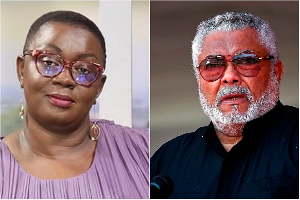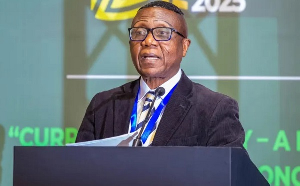BY ABENA POKUAA ATUAHENE ACKAH
As I sit in my home in these troubled times; I am plunged into deep thought about the challenges confronting Ghana and the African continent as a whole; the inability to provide informed and appropriate choices of information to our people; and the failure to utilize our natural resources to improve the socio-economic and cultural conditions of our people. I can foresee that, the destiny of the continent can only be shaped through a political trajectory that guides and directs our actions and inactions into a more agreeable and productive cause. Taking cognizance of the state of our nation and the continent, it has become obvious that we do not need divisive politics to demonstrate our commitment to democratic principles. Indeed the kind of divisive politics that we have inherited from those who enslaved us, colonized us and now exploit the least opportunity to continue to rip us off, has clearly - with the exception for those whom it benefits, failed - not only in Ghana, not only in Africa but all over the world.
This article seeks to set out the issues regarding democratic governance and analyses the drivers; implications of what seemingly is taking hold of the world politics today; and the need for a complete paradigm shift from a political system that promotes the grand ideas of other cultures and values into one that offers a more proactive and gainful political system that seeks to address the fundamental needs of the continent and give meaning and hope to the long-suffering people of the African continent.
In retrospect, we have witnessed two major political systems in the world, one describing itself as capitalism (the protagonists generally of Western Europe) and the other as communism (hitherto, generally practiced within the Eastern bloc of Europe and now in other geographical locations of the world). These political systems were designed and imposed to suit the values, aspirations and beliefs of their respective countries. Each political system was imbued with a unique form of democratic governance system, designed to improve the lives’ of their people. The ensuing contention that developed between these two political systems led to the descriptive coinage of the “Cold War” for which the consequential effect largely disrupted, stalled or affected in one way or the other, the development of newly independent states in Africa. With the collapse of the cold war which ostensibly emanated from the extinction of the communist policies of the eastern European bloc, the free-wheeling capitalist manipulations and interventions in our policies across Africa threw the continent into turmoil through coup d’etats and wars.
Driven by the imperialist motivation of domination and greed, they have again succeeded in manipulating the consciousness of African governments and people into aping their survival-of-the-strongest type of democracy as the only seemingly valid political system for mankind.
Let us explore the basic concept of the word democracy and the critical drivers for its sustainability. Democracy as espoused by some theories is a condition where citizens have equal say in decisions affecting their lives; and includes more or less participation in the development of the passage of legislative law. This implies that the thrust of democracy is to ensure the socio-economic rights of the people. The philosophical underpinning of democracy therefore, can be encapsulated in the reasonable availability and or the accessibility of quality education, good health care delivery, decent accommodation and the free participation in the decision-making process that governs one’s life. And so, it is the realization of improved socio-economic and cultural conditions that consent to free and equal practice of political self determination.
Let us examine some forms of democracy as illustrated below:
Types of Democracy Periodic Elections for Parties and or Reps Multi-Party System Unitary Party System Decision-making Participation by electorate Decision-making Process by elected Reps
1 Intra-Party Democracy ?
2 Liberal Democracy ? ? ?
3 Socialist Democracy ? ? ?
4 Western Democracy ? ? ?
5 Constitutional Monarchy ? ?
6 Non-Partisan Democracy ? ?
Having specified some types of democracy and their functions, it is important to look at the practicality of democratic systems prevailing in some nations to underpin the need for contextualizing the application of political system within the continent.
In Switzerland, the political system is formally a confederation that is similar in structure to federal republic and where all major decisions taken are by referendum. The state of Norway, Britain, Taiwan and Japan all operate as constitutional Monarchies where the monarchies remain the transmissible ceremonial heads of the nations. Malaysia is a constitutional monarchy, nominally headed by the paramount ruler and a bicameral parliament consisting of a non-elected upper house and elected lower house; Peninsular Malaysian states are the hereditary rulers. Malaka, George town (Penang), Sabah, and Sarawak are the only places where governors are appointed by the Malaysian government.
The United States of America operates a constitutional democracy where governance conforms to a national policy as well as any seemingly bad foreign policy of the state irrespective of its destructible nature to human life. Hence the numerous wars and interferences in other sovereign states witnessed over the years are as a result of the inability of presidents to alter any policy change. In effect, these actions undermine the very principles of democracy.
The above exposition depicts that different countries have pursued their democratic aspirations in different and varying ways; by and large the one that reflects their beliefs, values and culture. For example, in the United States the founding fathers took cognizance of their peculiar situation, the many wars they have fought, the exploitation of slavery, the diversity of culture and predominance of one race over others to propel them to produce a political system that has evolved over the years. The United States is perceived superficially by many, to be the most democratically practiced nation. On the contrary, there is no real democratic government in this world and there has never been. What we now have is nothing but oligarchic systems, generally a network of wealthy institutions and personalities. The very practice of majority rule embedded in democratic systems across the world, has the tendency of the opposing minority being oppressed by the tyranny of the majority which is in stark contrast to the fundamental rights and freedoms of people all over the world.
Currently, we are witnessing on the entire African continent, a rabid intoxication of the western type of democracy which to all intents and purposes is duplicating the fundamentally warped syndromes of more divisions, greater ethnocentrism, and acrimony, greed, corruption and self aggrandizement without any clear vision and strategic direction for development. Ethnicity is deepened by people’s inordinate desire for power in furtherance of the need to enhance the fortunes of one tribe or the other. We have seen electoral problems across the continent fired by continuous electoral disputes which underpins the ignorance and understanding of leaders. These disputes normally descend into civil wars and atrocious killings of citizenry all in a bid to gain power by one party or the other. What we see is that voters are simply manipulated by political parties on daily basis. In the end only few men rule the nation and the masses are directed to do as they are told or they take whatever is doled out to them during the term of those they voted for. Not only are the real people not governing themselves but clearly they are also not taking part in the governance system. “A government of the people, by the people, for the people” has never existed and will probably remain a mirage in the minds of its proponents so long as they live under the illusion that western democracy may one day extricate them from their misfortunes.
Clearly, the western type of democracy has taken grip on the continent. However, poverty, underdevelopment, illiteracy, sickness and injustice not only continue to plague the African continent but continue to deepen our woes of underdevelopment and poverty. We persistently demonstrate our inability to utilize our endowed natural resources despite many years of independence. Africans have refused to mold their own destiny hence resorting to political models of western countries that is clearly devoid of our socio-economic and cultural values and inconsistent with the spirit of self determination to set in motion the developmental agenda of the continent.
During the declaration of Ghana’s independence, the African of the millennium, the Osagyefo Dr. Kwame Nkrumah made a profound statement that “we must change our minds and attitudes and realize that we are no more colonial subjects but a free and independent people”. Although this statement presupposes that we as a people must be determined to free our thinking from the paradigms of colonial imperialism, we still lack the dogged determination to disentangle our thinking from the neo-colonial mindset which undermines the very quest for our development. In his letter to President Johnson of United States on 26th February, 1964, Dr Kwame Nkrumah stated, and I quote “Mr. President, the ravages of colonialism and its effect upon the territories now emerging from colonialism make it difficult and almost impossible for us in Africa to follow the traditional path of capitalist development”.
Over the years we have been going in circles without achieving any substantial transformation of the continent. Thus, I strongly disagree with president Obamaa when he made a statement during his visit to Ghana that “the continent does not need strong leaders but strong institutions”. Ghana and Africa need both strong institutions and strong leaders for which the latter is a conduit to shape the destiny of the continent through a clear vision and direction in order to build strong institutions. To say that we need strong institutions and not leaders is as fallacious as a newly independent poverty-stricken country emerging from 500m years of colonial oppression and terrorism opting for capitalism. Indeed this fallacy has been crafted to so permeate our minds and even our sub-consciousness that I have met tro-tro drivers who have claimed that they are capitalists and that as for this socialism thing ‘de?’ they don’t want it.
Clearly, governments have not been the solution to our problems. Government has rather been our problem. The politics of today is characterized by excessive reliance on money. Money has shaped politics and it is now the richest who is able to manipulate the electorate to his advantage. Politicians no longer understand or profess the truth because there is no profit for those who speak the truth especially when the truth may cause a loss of benefit. The people are desperately looking for development, survival, progress, good health systems, excellent education and so on and so forth. Therefore, any political system that fails to satisfy the aspirations of its citizenry is only a pet of delusion.
What we need is an entirely new scientific or customized approach to governance adapted to the need of the Africans. Africans must disentangle ourselves from the influences of western domination and begin to think deeply what political system can best be adapted to address the exigencies of our needs in order to provide radical solutions to our interminable problems created primarily by colonialism and neo-colonialism.
Opinions of Sunday, 17 April 2011
Columnist: Ackah, Abena Pokuaa Atuahene














